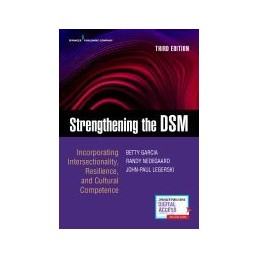- Obniżka


 Dostawa
Dostawa
Wybierz Paczkomat Inpost, Orlen Paczkę, DHL, DPD, Pocztę, email (dla ebooków). Kliknij po więcej
 Płatność
Płatność
Zapłać szybkim przelewem, kartą płatniczą lub za pobraniem. Kliknij po więcej szczegółów
 Zwroty
Zwroty
Jeżeli jesteś konsumentem możesz zwrócić towar w ciągu 14 dni*. Kliknij po więcej szczegółów
By demonstrating how to practically integrate diversity and intersectionality into the diagnostic process rather than limiting assessment to a purely problem-focused diagnostic label, this successful textbook strengthens the DSM for social workers and other mental health practitioners by promoting the inclusion of intersectionality, resiliency, culture, spirituality, and community into practice. It includes multiple case studies featuring complex, real life scenarios that offer a greater depth of learning by demonstrating how a strength-based assessment of the whole person can lead to more effective and successful treatment. Discussion questions promote critical thinking, key points in each chapter highlight and reinforce important concepts, and abundant web resources encourage additional study. The book also includes a robust instructor package. Purchase of the print edition includes access to digital version format.
New to the Third Edition::Opis
